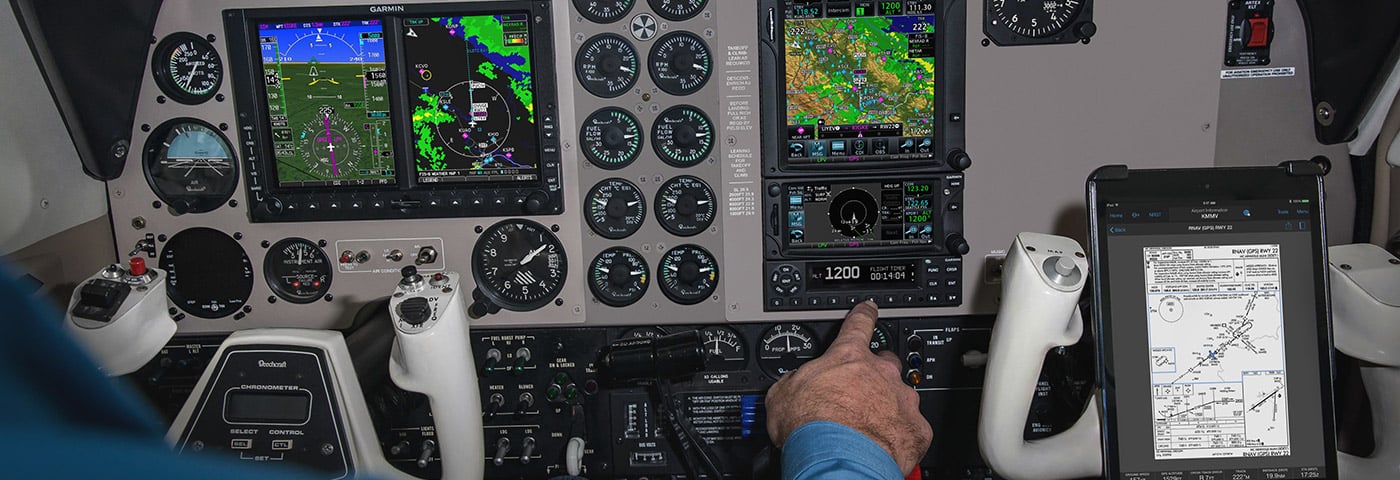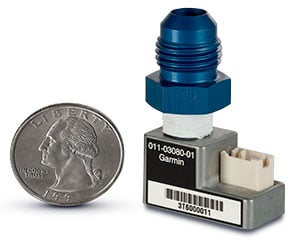
Meeting ADS-B equipage rules for NextGen airspace just got easier — and more beneficial — for thousands of aircraft owners worldwide.
With the introduction of the GTX 345 series of Mode S Extended Squitter (ES) transponders, Garmin provides a one-box, one-swap solution that enables owners and operators to meet ADS-B requirements with minimal expense, downtime and disruption to their panels — while providing all the weather and traffic benefits of ADS-B “In.”
Your Transition to NextGen Made Simple
The IFR-certified GTX 345 looks and operates like a standard Mode S transponder. It fits in the same 1.65-inch high slot in your avionics stack. It boasts a bright, sunlight-readable digital display, a pressure altitude readout, handy timers for approaches and other operations, plus dedicated pushbuttons numbered 0-9 for quick and easy squawk code entry. But where other transponders leave off, the GTX 345 is just getting started. The addition of 1090 MHz ADS-B “Out” transmission capability (using precise GPS-referenced positioning information) enables the transponder to automatically output the more accurate, more dynamic traffic surveillance data that the NextGen airspace system requires. For aircraft that may prefer or require a diversity solution, GTX 345 is available in a diversity configuration which utilizes two antennas — mounted on the top and bottom of the aircraft — to provide superior operational coverage. Plus, available ADS-B “In” reception unlocks even more capabilities for pilots, enabling them to display ADS-B traffic, weather and more on a variety of installed or portable displays.
Your WAAS, Your Way
The extra-precise GPS position reference needed to meet the traffic monitoring requirements of ADS-B can be provided either by the WAAS/SBAS-compliant navigation system that you may already have in your panel — or by an optional built-in GPS position source available with your GTX 345 transponder³. However your aircraft is currently equipped, the Garmin GTX 345 series offers a simple, minimally intrusive ADS-B solution to meet your needs. For even more flexibility, optional remote mount GTX versions are available for compatibility with the GTN™ 750/650 series of GPS/Comm/Nav systems, as well as select Garmin G1000® integrated flight deck systems — all of which provide built-in remote transponder code selection and control.
See the Benefits of ADS-B “In”
In addition to 1090 MHz ADS-B “Out”, the GTX 345 also makes available the subscription-free weather and traffic display capabilities enabled by ADS-B “In” — which can be interfaced with compatible cockpit displays or streamed wirelessly via Garmin Connext to our aera 796/795 and aera 660 series portables, as well as to tablets/mobile devices by way of the Garmin Pilot™, ForeFlight Mobile or FltPlan Go apps. The ADS-B weather link is continuously broadcast on the 978 MHz Universal Access Transceiver (UAT) frequency, and is similar to the basic services offered by leading commercial satellite weather providers. For example, you can access NEXRAD imagery, METARs, TAFs, winds and temperatures aloft, PIREPs, NOTAMs, and more1: Along with this, you can also receive ADS-B traffic position reports (and threat-level symbology) to help you see-and-avoid converging targets in busy airspace. Spoken audio alerts call out potential flight path conflicts (“Traffic, 10 O’Clock, same altitude, two miles”) to get you looking in the right direction. Meanwhile, on your display, Garmin’s patented TargetTrend™ relative motion display¹ offers a faster, more intuitive way of judging target trajectories and closure rates in relation to your flight path. As an added safety feature, available on most new Garmin products, our TerminalTraffic™ technology provides a comprehensive picture of ADS-B equipped aircraft and ground vehicles in the airport environment. ADS-B equipped aircraft in flight are easily distinguished from ground vehicles and taxiing aircraft, which are displayed using distinct colors and symbols. All of this information is presented on a simple, easy-to-understand SafeTaxi® diagram which references the location of runways, taxiways, hangar locations and more.
Dual-link Completes the Picture
The GTX 345 ADS-B receiver is a dual-link system. So, it can receive on both frequencies (978 MHz and 1090 MHz) authorized for ADS-B operations in the U.S. Not only does this provide the most complete traffic picture from aircraft transmitting on either frequency, but it also enhances your aircraft’s ability to access ADS-B transmissions and services from virtually anywhere. When integrating an active traffic system with the GTX 345, ADS-B traffic and active traffic targets are merged on the display to give pilots a truly comprehensive traffic picture.
ADS-B for Your Integrated Flight Deck
With a variety of compatibilities covering most fielded displays, our ADS-B enabled GTX series transponders offer the easiest NextGen upgrade path available from Garmin — especially for owners of select G1000-equipped aircraft. For these systems, a remote mount version, the GTX 345R, interfaces with either the aircraft’s existing WAAS position source for navigation or uses an optional built-in WAAS position source to meet ADS-B “Out” requirements. The G1000 series displays interface with the remote GTX transponder to provide onscreen squawk code entry and control in the conventional manner. Depending on the software version installed, your Garmin glass displays can also support subscription-free weather on the MFD — as well as ADS-B traffic targets on both the MFD and PFD displays for aircraft equipped with Synthetic Vision Technology (SVT™).

Alerting and Altitude Encoding Made Simple
For added situational awareness, the GTX 345 incorporates a built-in audio output for audible traffic and altitude alerts¹, which can be integrated into your existing audio panel. You can also pair the GTX series with an optional Garmin altitude encoder to satisfy data transmission requirements for IFR. As opposed to other transponders with altitude encoding built in, the Garmin altitude encoder mounts separately on the install rack. So, should the transponder ever require removal, there’s no need for the static line to be disconnected. Which, in turn, eliminates the need for a follow-on leak check — and thus helps minimize ongoing service costs.
An easier path to NextGen
The Garmin GTX 345 series is FAA and EASA approved for installation on hundreds of today’s most popular aircraft makes and models. For decades, Garmin has led in the development and deployment of ADS-B technology. And when you compare all the options available, it’s clear that Garmin is committed to making your transition to ADS-B operations as simple, economical and worry-free as possible.